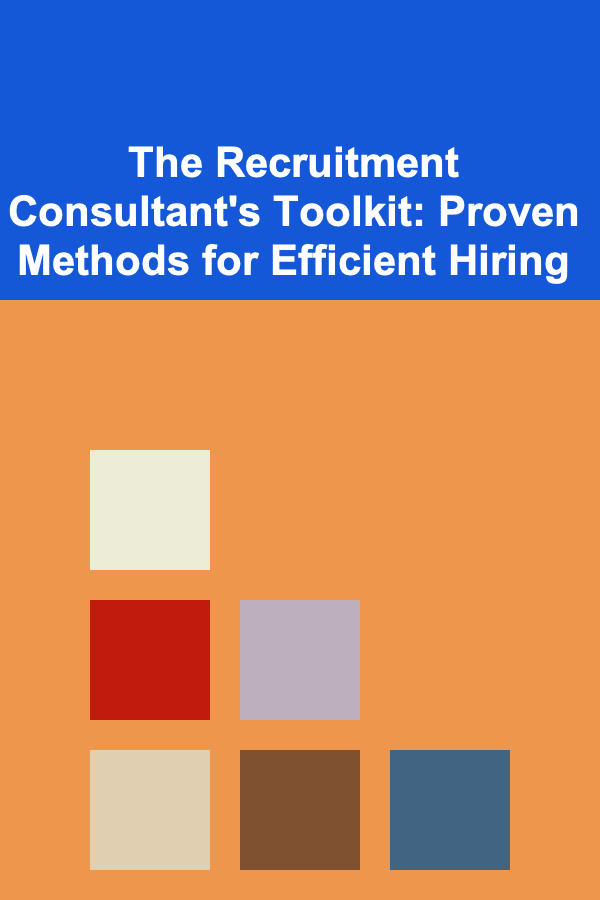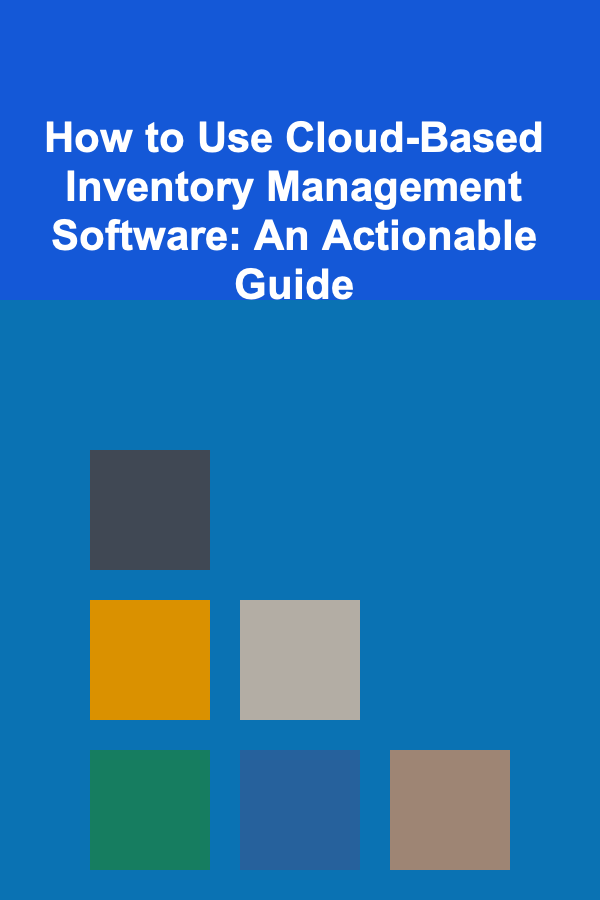
The Recruitment Consultant's Toolkit: Proven Methods for Efficient Hiring
ebook include PDF & Audio bundle (Micro Guide)
$12.99$8.99
Limited Time Offer! Order within the next:

Hiring the right talent is a critical factor for any organization's success. A recruitment consultant plays a pivotal role in this process, ensuring that companies attract the right candidates while saving time and resources. However, the recruitment landscape is continuously evolving, and consultants must adapt to new trends, tools, and best practices to remain competitive. This actionable guide explores the key strategies and tools every recruitment consultant should have in their toolkit for efficient and effective hiring.
Understanding the Role of a Recruitment Consultant
At its core, the role of a recruitment consultant is to bridge the gap between employers and candidates. Their responsibilities include:
- Identifying client needs: Consultants work closely with clients to understand the company's culture, values, and specific hiring requirements.
- Sourcing candidates: Using multiple channels to find qualified candidates, both active and passive.
- Screening and shortlisting: Reviewing resumes, conducting interviews, and assessing candidates' skills and fit.
- Managing the hiring process: From scheduling interviews to negotiating offers and handling rejections, a recruitment consultant ensures the process runs smoothly.
- Building relationships: Consultants build long-term relationships with both clients and candidates, ensuring continued trust and future collaborations.
To achieve these responsibilities effectively, consultants need a comprehensive toolkit that includes methods, technologies, and strategies that streamline and enhance the recruitment process.
Proven Methods for Efficient Hiring
2.1 Building a Strong Candidate Sourcing Strategy
Sourcing the right candidates is the first and most crucial step in the hiring process. A recruitment consultant must use a mix of sourcing channels to ensure a steady pipeline of talent.
a. Job Boards and Career Websites
Traditional job boards like LinkedIn, Indeed, and Glassdoor remain essential tools for recruitment consultants. By posting well-crafted job ads and leveraging keywords that align with the client's requirements, consultants can attract qualified candidates. However, consultants must focus on posting on niche job boards tailored to specific industries, such as:
- AngelList for startups and tech roles
- Hired for tech and sales professionals
- Behance for design and creative talent
b. Social Media Recruiting
Social media platforms like LinkedIn, Twitter, and even Facebook are great tools for sourcing candidates. LinkedIn, in particular, is invaluable due to its professional nature. Recruitment consultants should use LinkedIn's advanced search features to find passive candidates---those not actively looking for a job but open to new opportunities.
- Personal branding: Consultants can build their personal brand and reputation on LinkedIn by sharing industry insights, connecting with professionals, and participating in relevant discussions.
- LinkedIn Recruiter: This is an essential paid tool that provides in-depth candidate search, InMail capabilities, and organizational features that streamline recruitment efforts.
c. Employee Referrals
One of the most effective ways to find qualified candidates is through employee referrals. People in the industry often have networks of talented professionals, and a good referral program can lead to faster and more reliable hires. Consultants should encourage clients to implement or enhance their employee referral programs to take advantage of this valuable sourcing method.
d. Boolean Search
Boolean search is an advanced technique for refining candidate searches. By combining keywords with operators like AND, OR, and NOT, consultants can conduct highly targeted searches on search engines, job boards, and social media platforms. For example, a search for "Software Developer AND Java AND 'Full Stack' NOT 'Intern'" will help filter out irrelevant candidates and focus on those with the exact skills required.
2.2 Screening Candidates Like a Pro
Efficient candidate screening is essential for identifying top talent quickly. Here are some best practices to streamline the process:
a. Resume Parsing and Applicant Tracking Systems (ATS)
Most large organizations use ATS to filter through resumes automatically. Consultants should be familiar with the software used by their clients and tailor resumes to pass through these systems.
- Resume Parsing: Tools like Jobscan and Resumake can help consultants ensure that resumes are properly formatted and keyword-optimized to increase their chances of getting noticed by ATS systems.
b. Pre-Screening Questions and Assessments
Using pre-screening questions can help consultants quickly identify if a candidate meets the basic qualifications for a role. These can be automated through online platforms like SurveyMonkey or Google Forms . Additionally, utilizing skill-based assessments, such as coding tests on HackerRank or marketing tests on Vervoe, can help ensure that candidates have the technical competencies needed for the role.
c. Behavioral Interviewing
Behavioral interviews are an excellent way to assess how a candidate will behave in specific situations based on their past experiences. Consultants can use frameworks like STAR (Situation, Task, Action, Result) to guide their questions. This method helps recruiters gain insight into the candidate's problem-solving abilities, teamwork, leadership, and adaptability.
d. Personality and Cultural Fit Assessments
A candidate's technical ability is essential, but cultural fit is just as important for long-term success. Tools like CultureAmp and Gallup StrengthsFinder allow recruitment consultants to assess a candidate's personality, strengths, and potential cultural alignment with a client's organization.
2.3 Streamlining the Interview Process
Managing the interview process efficiently is key to keeping candidates engaged and ensuring the best hire is made. Recruitment consultants can implement the following methods to improve the interview experience for both clients and candidates:
a. Structured Interview Templates
Having structured interview templates ensures consistency and fairness throughout the hiring process. Consultants should develop a set of standardized questions tailored to each role, focusing on the most relevant skills and experiences.
b. Interview Scheduling Tools
Scheduling interviews can often be a logistical nightmare. Tools like Calendly , Doodle , and GoodTime allow recruiters to streamline the process, allowing clients and candidates to easily select available times without the back-and-forth of emails.
c. Video Interviews
Especially for remote positions, video interviews are a cost-effective and efficient way to assess candidates. Platforms like Zoom , Microsoft Teams , and HireVue offer easy-to-use solutions that allow consultants to conduct interviews, record them, and share them with clients for further evaluation.
2.4 Closing the Deal and Negotiating Offers
Once the ideal candidate is identified, recruitment consultants must manage the offer and negotiation process effectively.
a. Salary Benchmarking Tools
Consultants should be armed with reliable salary data to ensure that both clients and candidates are satisfied with the offer. Tools like Glassdoor , PayScale , and Salary.com provide valuable insights into industry-specific compensation trends and help recruiters negotiate fair offers.
b. Clear Communication
Maintaining open, transparent communication with both clients and candidates is critical during the offer stage. Consultants must be prepared to discuss compensation packages, benefits, company culture, and career growth opportunities to ensure candidates are excited about the role.
c. Offer Letters and Contracts
Consultants should collaborate with clients to draft clear and legally sound offer letters and employment contracts. This is crucial to ensure that both parties understand the terms of employment and that the process is seamless for the candidate.
Leveraging Technology for Recruitment Efficiency
3.1 Applicant Tracking Systems (ATS)
An ATS helps streamline the recruitment process by automating tasks like resume parsing, candidate communication, and interview scheduling. It helps recruitment consultants stay organized and track candidates' progress through the hiring pipeline. Popular ATS tools include Bullhorn , Greenhouse , and Lever.
3.2 Recruitment CRMs
Customer Relationship Management (CRM) tools like HubSpot and Salesforce can also be highly beneficial for recruitment consultants. These tools allow consultants to manage client relationships, track communication, and store relevant candidate and client information in one central database.
3.3 Chatbots and AI-powered Tools
AI-powered chatbots like XOR and Mya can assist in candidate engagement by answering basic questions, screening candidates, and scheduling interviews. These tools save consultants time, allowing them to focus on higher-level tasks.
3.4 Data Analytics and Reporting
Using data analytics tools like Google Analytics or Tableau can help consultants evaluate their recruitment strategies. By tracking metrics such as time-to-hire, cost-per-hire, and candidate satisfaction, consultants can continuously improve their processes and make data-driven decisions.
Conclusion
The recruitment consultant's role is both dynamic and crucial to a company's success. By using a combination of proven methods, technology, and effective communication skills, consultants can streamline the hiring process, making it faster, more efficient, and more impactful. Building strong relationships with clients and candidates, leveraging the latest recruitment tools, and continuously refining strategies will ensure that recruitment consultants remain at the forefront of the hiring process, ultimately making a significant impact on the workforce of the organizations they serve.

How to Create a Clutter-Free Kitchen with Smart Storage Solutions
Read More
How to Decorate Your Home for Less Using Online Marketplaces
Read More
How to Use Cloud-Based Inventory Management Software: An Actionable Guide
Read More
Social Justice: Advocating for Equality and Fairness in Society
Read More
The Ultimate Sales Executive Handbook: Tips for Driving Revenue and Growth
Read More
What Items Are Essential for an Organized Craft Space?
Read MoreOther Products

How to Create a Clutter-Free Kitchen with Smart Storage Solutions
Read More
How to Decorate Your Home for Less Using Online Marketplaces
Read More
How to Use Cloud-Based Inventory Management Software: An Actionable Guide
Read More
Social Justice: Advocating for Equality and Fairness in Society
Read More
The Ultimate Sales Executive Handbook: Tips for Driving Revenue and Growth
Read More